New arts school offers alternative in downtown Lebanon
|
Published: 03-28-2025 5:01 PM
Modified: 03-30-2025 1:27 PM |
LEBANON — On an afternoon in late January, students of a new arts-based private school in downtown Lebanon were busy working on their creative projects.
Seventh grade student Jane Mans rehearsed a series of poses before a mirror in a private ballet class. Down the hall, 16-year-old Lilly Wolfinger drafted notes for a creative writing assignment, while 11th grader Aristotle Williamson brainstormed ideas for a project on the Civil Rights Movement for his social studies class.
That morning, they’d joined five other students for a humanities block with former Hartford High School English teacher, Alexis Nelson, who’d assigned them “Of Mice and Men” as part of an unit on the American Dream.
New England School of the Arts, or NESA, is the brainchild of former Hanover High School music coordinator, Jennifer Chambers. After delaying the launch by a year, which Chambers attributed to the building’s elevator not being ready, NESA opened its doors last fall.
“I’m so glad we took a chance on it,” said Jane’s mother, Katie Mans, who previously homeschooled her daughter from their house in Plainfield.
Chambers has ambitious goals for the school. Her dream is to build a middle and high school where students from across New England can attain a rigorous education in performing arts.
“I wanted to create an integrated curriculum where the artistic disciplines weren’t siloed, but were the fabric that was connected to what we consider the typical core academic subjects,” she said in a recent interview.
Chambers, who holds a degree in music education, has worked in public schools most of her life, including 10 years at Hanover High School, which she left in 2024 to start NESA.
Article continues after...
Yesterday's Most Read Articles
 After a year of looking, White River Junction couple finds new home
After a year of looking, White River Junction couple finds new home
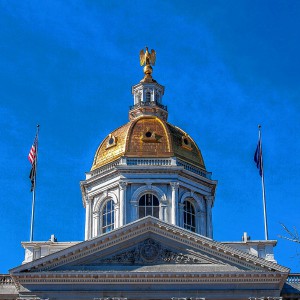 NH Republicans move forward with three different plans to expand EFAs
NH Republicans move forward with three different plans to expand EFAs
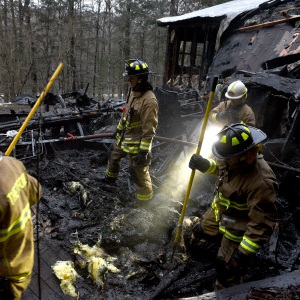 Fires destroy two Upper Valley homes
Fires destroy two Upper Valley homes
“I’m an incredible advocate for public school education and see the value in it,” she said.
But she said there are holes in the public school system’s pedagogy, especially when it comes to the arts.
“So often the arts are referred to as ‘extras’ or ‘electives,’ or not the meat and potatoes of education,” she said.
Chambers and her husband, Carl, who is the principal of the Pike campus of Mount Prospect Academy, a private school for students with behavioral challenges, had always toyed with the idea of starting their own school, but watching arts programs get cut nationwide during the pandemic inspired Chambers to take the plunge.
Even at Hanover, “the priority wasn’t performing, it wasn’t singing, it wasn’t the arts, it was keeping kids safe in the classroom, which is also important, but it made me realize … everything related to arts education is really a therapeutic thing for students and for all of that to be shut down, especially when people were having to isolate and separate, was devastating,” she said.
When it came to scouting locations, Carl, who serves on NESA’s board, encouraged her to leverage existing spaces.
“Don’t go buying land or anything like that,” he said. “Start small so you can guarantee success.”
In 2022, Chambers settled on a 5,000-square-foot space sandwiched between River Valley Community College and the Osher Lifelong Learning Institute. The space is leased from Hanover-based owner HSD Inc. on a year-to-year contract.
As the school grows, Chambers hopes to lease space from community organizations such as AVA Gallery and the Carter Community Building Association, a recreation center in Lebanon.
The school currently teaches eight students ranging from grade seven through 11, but Carl estimates that number could grow to 50 or 100 kids in five years’ time.
Chambers plans to build those numbers through advertising, including word of mouth, and by fostering credibility in the community.
NESA currently has two full-time teachers in addition to Chambers, and six part-time instructors, such as Dartmouth Spanish professor Natalia X Monetti, who teach languages, dance and acting. Area artists have also led classes at NESA as part of the school’s “city campus” model, an experience-based approach that exposes students to neighboring arts organizations.
Last semester, Michael Albrecht, an instructor at the Center for Cartoon Studies in White River Junction, led students in a cartooning workshop.
Williamson, a former student at Oxbow High School in Bradford, Vt., said he’d always wanted to try cartooning, but he “never would have had time for that,” at his old school.
Current students are all from the area, but long-term plans are more expansive. “Our goal is to offer boarding, but we’re not going to do that for a couple years,” Chambers said.
For now, students all take classes together, which might appear unconventional, but Chambers sees advantages to mixing the grades.
“We don’t live in a world where we’re siloed by our age or our grade, so it’s so artificial to go through school in these grouped classes,” she said.
NESA uses the Harkness method, in which students unpack lessons and texts through discussion, usually around a large table, instead of at desks. The main classroom, a spacious, open-plan room, also doubles as a rehearsal space for dance and acting classes.
A discussion-based model makes it easier to involve a wide range of ages, but it’s also intended to help kids feel empowered in the classroom.
“It’s really the idea that these students are stakeholders in their own education,” Chambers said.
As part of an interdisciplinary approach, last semester students studied “The Odyssey” from a host of angles. Assignments included comparing translations from their favorite episode in the story and building scaled models of what their bedrooms would look like if they were the child of a Greek god or goddess.
“It was a nice way to tie a realistic application of math to what’s obviously a contrived project of building a bedroom for a demigod,” said Matt Huyck, NESA’s math and science teacher.
NESA’s teachers try to keep homework to a minimum, and most students have only about half an hour to do each night.
“It’s like breathing in after a marathon,” said 10th grader Ian Stacy, who transferred from Lebanon High School where he used to have a couple hours of homework most week nights.
NESA is marketed primarily to kids who want to pursue a career in the arts, and students have the afternoons to work on their discipline of choice, such as singing, acting and ballet.
Jane, who wants a career in musical theater, receives four hours of dance class a week, plus individual vocal instruction from Chambers.
“The support she’s received from the faculty has been a wonderful new thing for her,” Katie Mans said.
Other students have benefited from NESA’s small size, like Lilly and Elena Wolfinger, who transferred from the Kearsarge Regional School District.
Introverted, they both struggled socially at school. “At the end of the day, that wasn’t the right environment for my girls,” said their dad, Mike Wolfinger, a director of engineering at Fujifilm in Lebanon.
“With one of them, you’ve got to take the time to form a relationship to really get to know what she needs and that wasn’t happening at Kearsarge, and it is happening at NESA. They take the time to get to know the kids,” he said.
Wolfinger and his wife, Josie, looked at other private schools, but preferred NESA’s style of curriculum.
“NESA takes a more holistic approach that the kids really enjoy, and that I think is good for them specifically,” he said.
Even though NESA is small and its curriculum unconventional, Wolfinger said he isn’t worried about his daughters keeping up in college. “I think they’re going to be better-prepared than they were at Kearsarge,” he said.
While a school like NESA is new to the region, arts-based schools have a longstanding tradition in other parts of the country.
“It’s not uncommon for larger urban districts to have a magnet school or a charter school that’s focused on the arts,” said Page Tompkins, president of the Upper Valley Educators Institute in Lebanon. “I think the thing that’s noticeable here is that there’s not the same population density.”
That distinction might make it harder for the school to drum up students, especially with tuition set at $31,000 a year.
NESA offers financial aid, and Chambers hopes to offset that price with endowment money, but for now the school relies on donors such as the Byrne Foundation and the Green Mountain Foundation, whose president Kathleen Dolan founded Pomfret-based arts nonprofit Artistree in 2003.
This year, the school’s operating budget is $600,000.
Dolan sees NESA as a worthy option for kids who are passionate about the arts.
“I think there’s so much emphasis on academics for kids, and there are art programs offered in public school, but if you want to really dive into those (subjects), I think you’re limited in a public school context,” she said in a phone interview.
Chambers approached Dolan four years ago, when NESA was still just an idea. “I’m happy that she was able to launch it. It was a little touch and go for a minute there. She’s a very determined woman,” Dolan said.
Marion Umpleby can be reached at mumpleby@ vnews.com or 603-727-3306.
CORRECTION: Michael Albrecht, an instructor at the Center for Cartoon Studies i n White River Junction, led students at New England School of the Arts, a private arts school in Lebanon, in a cartooning workshop. A previous version of this story provided an incorrect name for the cartooning teacher.

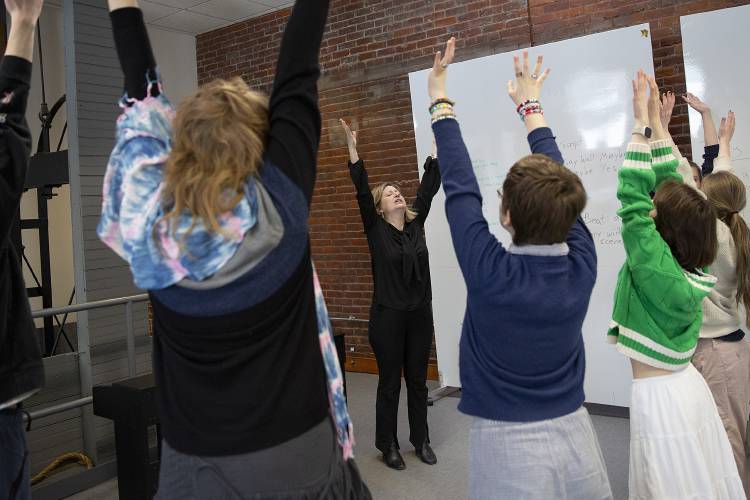




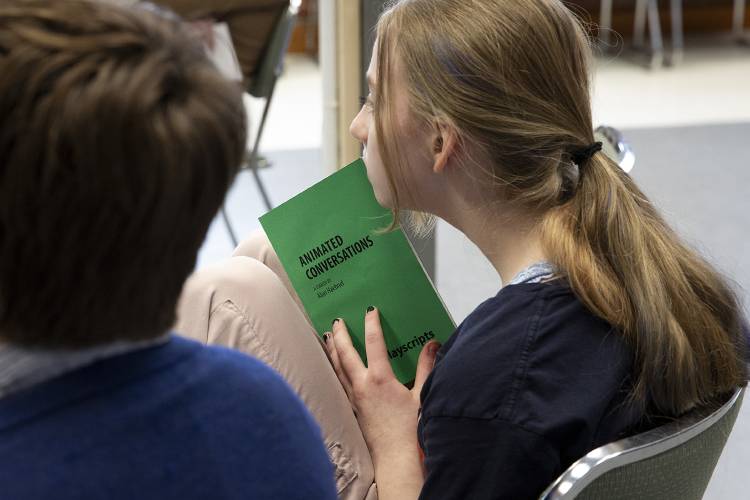





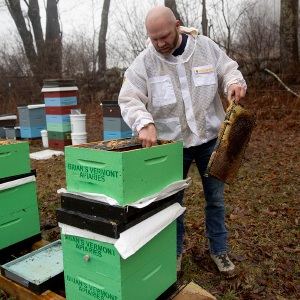 Upper Valley beekeepers assess winter losses
Upper Valley beekeepers assess winter losses 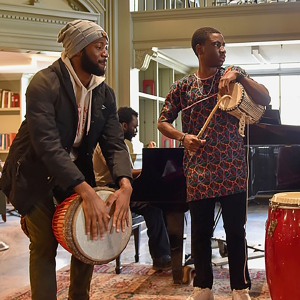 Art Notes: ‘If you love ‘Messiah,’ you’ll love this piece’
Art Notes: ‘If you love ‘Messiah,’ you’ll love this piece’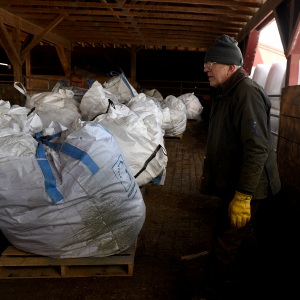 Farmer-led project gets grant to recycle agricultural plastics
Farmer-led project gets grant to recycle agricultural plastics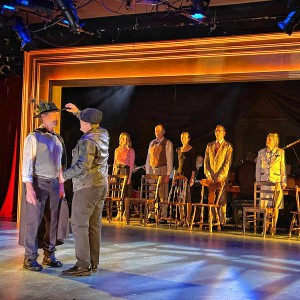 Art Notes: We the People’s latest show offers hopeful message
Art Notes: We the People’s latest show offers hopeful message
